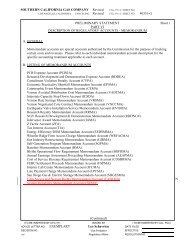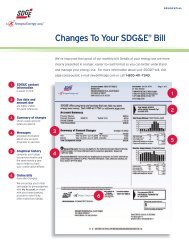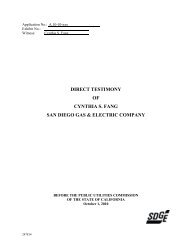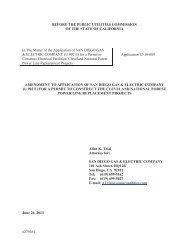Joint Reply Brief of SDG&E & SCE on Retroactive Ratemaking Legal ...
Joint Reply Brief of SDG&E & SCE on Retroactive Ratemaking Legal ...
Joint Reply Brief of SDG&E & SCE on Retroactive Ratemaking Legal ...
Create successful ePaper yourself
Turn your PDF publications into a flip-book with our unique Google optimized e-Paper software.
BEFORE THE PUBLIC UTILITIES COMMISSION<br />
OF THE STATE OF CALIFORNIA<br />
Order Instituting Investigati<strong>on</strong> <strong>on</strong> the<br />
Commissi<strong>on</strong>’s Own Moti<strong>on</strong> into the Rates,<br />
Operati<strong>on</strong>s, Practices, Services and Facilities<br />
<str<strong>on</strong>g>of</str<strong>on</strong>g> Southern California Edis<strong>on</strong> Company and<br />
San Diego Gas and Electric Company<br />
Associated with the San On<str<strong>on</strong>g>of</str<strong>on</strong>g>re Nuclear<br />
Generating Stati<strong>on</strong> Units 2 and 3.<br />
Investigati<strong>on</strong> 12-10-013<br />
(Issued November 1, 2012)<br />
REPLY BRIEF ON LEGAL ISSUES IN SUPPORT OF RESPONSE OF SOUTHERN<br />
CALIFORNIA EDISON COMPANY (U338-E) AND SAN DIEGO GAS & ELECTRIC<br />
COMPANY (U902-E) TO ORDER INSTITUTING INVESTIGATION REGARDING<br />
SAN ONOFRE NUCLEAR GENERATING STATION UNITS 2 AND 3<br />
DOUGLAS K. PORTER<br />
WALKER A. MATTHEWS<br />
RUSSELL A. ARCHER<br />
Southern California Edis<strong>on</strong> Company<br />
2244 Walnut Grove Avenue<br />
Post Office Box 800<br />
Rosemead, CA 91770<br />
Teleph<strong>on</strong>e: (626) 302-6879<br />
Facsimile: (626) 302-3990<br />
E-mail: Walker.matthews@sce.com<br />
HENRY WEISSMANN<br />
JONATHAN E. ALTMAN<br />
JOHN B. OWENS<br />
LIKA C. MIYAKE<br />
Munger, Tolles & Ols<strong>on</strong> LLP<br />
355 South Grand Avenue, 35th Floor<br />
Los Angeles, CA 90071<br />
Teleph<strong>on</strong>e: (213) 683-9150<br />
Facsimile: (213) 683-5150<br />
E-mail: Henry.Weissmann@mto.com<br />
Attorneys for<br />
SOUTHERN CALIFORNIA EDISON COMPANY<br />
JAMES F. WALSH<br />
STACY VAN GOOR<br />
101 Ash Street, HQ12D<br />
San Diego Gas & Electric Company<br />
San Diego, CA 92101-3017<br />
Teleph<strong>on</strong>e: (619) 699-5022<br />
Facsimile: (619) 699-5027<br />
E-mail: jfwalsh@semprautilities.com<br />
Attorneys for<br />
SAN DIEGO GAS & ELECTRIC COMPANY<br />
Dated: March 7, 2013
TABLE OF <br />
Page<br />
I. INTRODUCTION ................................................................................................. 1<br />
II. DISCUSSION ........................................................................................................ 3<br />
A. The Commissi<strong>on</strong> May Reduce The Utilities’ Rates Based On The<br />
SONGS Outage Only In Accordance With Secti<strong>on</strong> 455.5’s<br />
Prescribed Timing ...................................................................................... 3<br />
1. The Opposing Parties’ Reliance On General Jurisdicti<strong>on</strong>al<br />
Statutes To Avoid The Specific Timing Requirements Of<br />
Secti<strong>on</strong> 455.5 Fails As A Matter Of Law ...................................... 3<br />
2. A Number Of The General Statutes On Which The<br />
Opposing Parties Rely Are Irrelevant In Any Event ..................... 7<br />
3. The Plain Language Of Secti<strong>on</strong> 455.5 Prohibits The<br />
Commissi<strong>on</strong> From Reducing Rates Prior to the Utilities’<br />
Next GRCs, And Requires The Commissi<strong>on</strong> To Set Rates<br />
Subject To Refund From The Date The OII Issued ....................... 9<br />
B. The <strong>Retroactive</strong> <strong>Ratemaking</strong> Doctrine Precludes The Commissi<strong>on</strong><br />
From Ordering A Refund Of Rates Collected Prior To November<br />
1, 2012 Pursuant To <str<strong>on</strong>g>SCE</str<strong>on</strong>g>’s 2009 GRC and SDG&E’s 2008 GRC ......... 18<br />
III. CONCLUSION .................................................................................................... 21<br />
-i-
TABLE OF AUTHORITIES<br />
Page<br />
FEDERAL CASES<br />
Coady v. Vaughn,<br />
251 F.3d 480 (3rd Cir. 2001) .....................................................................................5, 7<br />
STATE CASES<br />
Assembly <str<strong>on</strong>g>of</str<strong>on</strong>g> the State <str<strong>on</strong>g>of</str<strong>on</strong>g> Cal. v. Public Util. Comm’n,<br />
12 Cal. 4th 87 (1995) ........................................................................................... passim<br />
Pacific Tel. & Tel. Co. v. Public Util. Comm’n.<br />
62 Cal. 2d 634 (1965) ....................................................................................................5<br />
P<strong>on</strong>derosa Teleph<strong>on</strong>e Co., v. Public Utilities Commissi<strong>on</strong>,<br />
197 Cal. App. 4th 48 (2011) ..................................................................................21, 22<br />
CASES<br />
In re PacifiCorp,<br />
2006 WL 1049355 .......................................................................................................12<br />
STATE STATUTES<br />
Public Utilities Code § 451 ..........................................................................................3, 4, 6<br />
Public Utilities Code § 455.5 ..................................................................................... passim<br />
Public Utilities Code § 453.3 ...............................................................................................4<br />
Public Utilities Code § 453.5 ...........................................................................................4, 5<br />
Public Utilities Code § 454.8 ...........................................................................................3, 9<br />
Public Utilities Code § 463(a) ..................................................................................3, 7, 8, 9<br />
Public Utilities Code § 701 ..........................................................................................3, 5, 6<br />
Public Utilities Code § 729 ................................................................................................17<br />
STATUTES<br />
Oreg<strong>on</strong> Revised Statute § 757.355 18<br />
-ii-
Southern California Edis<strong>on</strong> Company (“<str<strong>on</strong>g>SCE</str<strong>on</strong>g>”) and San Diego Gas & Electric<br />
Company (“SDG&E”) (collectively the “Utilities”) respectfully submit this <str<strong>on</strong>g>Reply</str<strong>on</strong>g> <str<strong>on</strong>g>Brief</str<strong>on</strong>g><br />
<strong>on</strong> <strong>Legal</strong> Issues in resp<strong>on</strong>se to the Opening <str<strong>on</strong>g>Brief</str<strong>on</strong>g>s filed by various parties (collectively<br />
the “Opposing Parties”) 1 <strong>on</strong> February 25, 2012.<br />
I. INTRODUCTION<br />
The Utilities’ opening brief (“Util. Op. Br.”) established that Public Utilities Code<br />
secti<strong>on</strong> 455.5 requires the Commissi<strong>on</strong> to make rates associated with the San On<str<strong>on</strong>g>of</str<strong>on</strong>g>re<br />
Nuclear Generating Stati<strong>on</strong> (“SONGS”) subject to refund “from the date the order<br />
instituting the investigati<strong>on</strong> [to determine whether to reduce the rates] was issued.”<br />
§ 455.5(c). 2 As explained in the opening brief, the Commissi<strong>on</strong> cannot make its subjectto-refund<br />
order retroactive to January 1, 2012, as this would violate secti<strong>on</strong> 455.5 and the<br />
rule against retroactive ratemaking.<br />
Secti<strong>on</strong> 455.5 also provides that the Commissi<strong>on</strong> must c<strong>on</strong>solidate its “hearing <strong>on</strong><br />
the investigati<strong>on</strong>” with the utilities’ next general rate cases. 3<br />
The Commissi<strong>on</strong> may not<br />
reduce the rates associated with SONGS prior to such hearing. Id.<br />
1 <str<strong>on</strong>g>SCE</str<strong>on</strong>g> and SDG&E received opening briefs from the Divisi<strong>on</strong> <str<strong>on</strong>g>of</str<strong>on</strong>g> Ratepayer Advocates, The<br />
Utility Reform Network, Friends <str<strong>on</strong>g>of</str<strong>on</strong>g> the Earth and the World Business Academy, Alliance for<br />
Nuclear Resp<strong>on</strong>sibility, Utility C<strong>on</strong>sumers’ Acti<strong>on</strong> Network, Coaliti<strong>on</strong> <str<strong>on</strong>g>of</str<strong>on</strong>g> California Utility<br />
Employees, the Clean Coaliti<strong>on</strong>, Women’s Energy Matters, and Ruth Henricks. As stated in the<br />
text, these are referred to collectively as the “Opposing Parties.”<br />
2 All statutory citati<strong>on</strong>s are to the California Public Utilities Code.<br />
3 The vast majority <str<strong>on</strong>g>of</str<strong>on</strong>g> SDG&E’s SONGS-related revenue requirement is litigated in <str<strong>on</strong>g>SCE</str<strong>on</strong>g>’s GRCs,<br />
and then transferred to SDG&E’s base rates through a ministerial process based <strong>on</strong> SDG&E’s<br />
ownership percentage in SDG&E’s GRCs. Accordingly, and for ease <str<strong>on</strong>g>of</str<strong>on</strong>g> reference, this brief<br />
generally refers to <str<strong>on</strong>g>SCE</str<strong>on</strong>g>’s next GRC (i.e., the 2015 <str<strong>on</strong>g>SCE</str<strong>on</strong>g> GRC) as the appropriate forum for the<br />
c<strong>on</strong>solidated hearing <strong>on</strong> the investigati<strong>on</strong>. However, a certain subset <str<strong>on</strong>g>of</str<strong>on</strong>g> SDG&E SONGS-related<br />
revenue requirement is not ownership-percentage-derivative <str<strong>on</strong>g>of</str<strong>on</strong>g> <str<strong>on</strong>g>SCE</str<strong>on</strong>g>’s SONGS-related revenue<br />
requirement, but is instead litigated <strong>on</strong> the merits in SDG&E’s GRCs. For that subset <str<strong>on</strong>g>of</str<strong>on</strong>g> SDG&E<br />
SONGS-related costs, the appropriate forum for the c<strong>on</strong>solidated hearing <strong>on</strong> the investigati<strong>on</strong> is<br />
SDG&E’s next GRC.<br />
1
In resp<strong>on</strong>se to the Utilities’ straightforward interpretati<strong>on</strong> <str<strong>on</strong>g>of</str<strong>on</strong>g> Secti<strong>on</strong> 455.5,<br />
Opposing Parties argue, am<strong>on</strong>g other things, that (1) the Commissi<strong>on</strong>’s general<br />
regulatory authority trumps the specific terms <str<strong>on</strong>g>of</str<strong>on</strong>g> secti<strong>on</strong> 455.5, which govern the timing<br />
<str<strong>on</strong>g>of</str<strong>on</strong>g> the subject-to-refund c<strong>on</strong>diti<strong>on</strong> and any rate reducti<strong>on</strong>s; (2) the plain language <str<strong>on</strong>g>of</str<strong>on</strong>g><br />
secti<strong>on</strong> 455.5 means the opposite <str<strong>on</strong>g>of</str<strong>on</strong>g> what it actually says, and allows the Commissi<strong>on</strong> to<br />
reduce rates at any time, including the day after an outage; and (3) the creati<strong>on</strong> <str<strong>on</strong>g>of</str<strong>on</strong>g> a GRC<br />
memorandum account for reas<strong>on</strong>s having nothing to do with the SONGS outage, and<br />
with no notice that costs associated with that outage might be subject to refund, is<br />
sufficient to avoid the retroactive ratemaking doctrine.<br />
These arguments, as well as the others <str<strong>on</strong>g>of</str<strong>on</strong>g>fered by the Opposing Parties, are<br />
without merit. The California Supreme Court has repeatedly held that general<br />
jurisdicti<strong>on</strong>al statutes do not grant the Commissi<strong>on</strong> power to ignore the specific<br />
legislative directives c<strong>on</strong>tained in the Public Utilities Code. Assembly <str<strong>on</strong>g>of</str<strong>on</strong>g> the State <str<strong>on</strong>g>of</str<strong>on</strong>g> Cal.<br />
v. Public Util. Comm’n, 12 Cal. 4th 87, 103 (1995). Secti<strong>on</strong> 455.5 represents <strong>on</strong>e <str<strong>on</strong>g>of</str<strong>on</strong>g><br />
those directives. The legislative history shows secti<strong>on</strong> 455.5 was enacted principally to<br />
insure that the Commissi<strong>on</strong> followed a specific schedule in resolving issues c<strong>on</strong>nected to<br />
a prol<strong>on</strong>ged facility outage. That prescribed schedule requires the Commissi<strong>on</strong> to make<br />
SONGS rates subject to refund as <str<strong>on</strong>g>of</str<strong>on</strong>g> the date the OII issued, not ten m<strong>on</strong>ths before the<br />
OII issued. The legislative history also makes clear that the intent <str<strong>on</strong>g>of</str<strong>on</strong>g> the statute is to<br />
permit rate reducti<strong>on</strong>s <strong>on</strong>ly in c<strong>on</strong>necti<strong>on</strong> with a utility’s next general rate case, not<br />
before. Moreover, n<strong>on</strong>e <str<strong>on</strong>g>of</str<strong>on</strong>g> the parties even attempt to address the authorities cited in the<br />
Utilities’ opening brief, which show that, absent proper notice, the existence <str<strong>on</strong>g>of</str<strong>on</strong>g> a 2012<br />
2
GRC memorandum account provides no justificati<strong>on</strong> for retroactively making SONGSrelated<br />
rates subject to refund.<br />
Therefore, the Commissi<strong>on</strong> should find (1) that it lacks legal authority to reduce<br />
SONGS rates prior to the Utilities’ next general rate cases; and (2) that the Commissi<strong>on</strong><br />
lacks legal authority to set rates subject to refund in c<strong>on</strong>necti<strong>on</strong> with the SONGS outages<br />
prior to November 1, 2012.<br />
II.<br />
DISCUSSION<br />
A. The Commissi<strong>on</strong> May Reduce The Utilities’ Rates Based On The<br />
SONGS Outage Only In Accordance With Secti<strong>on</strong> 455.5’s Prescribed<br />
Timing<br />
1. The Opposing Parties’ Reliance On General Jurisdicti<strong>on</strong>al<br />
Statutes To Avoid The Specific Timing Requirements Of<br />
Secti<strong>on</strong> 455.5 Fails As A Matter Of Law<br />
The Utilities do not dispute that the Commissi<strong>on</strong> has the legal authority to reduce<br />
rates to reflect disallowed costs associated with SONGS. The <strong>on</strong>ly questi<strong>on</strong> is when that<br />
legal authority may be exercised. Despite the temporal restricti<strong>on</strong>s in Secti<strong>on</strong> 455.5, the<br />
Divisi<strong>on</strong> <str<strong>on</strong>g>of</str<strong>on</strong>g> Ratepayer Advocates (“DRA”), al<strong>on</strong>g with The Utility Reform Network,<br />
Friends <str<strong>on</strong>g>of</str<strong>on</strong>g> the Earth, and the World Business Academy (collectively “TURN”), argue that<br />
the Commissi<strong>on</strong> may make costs associated with an out-<str<strong>on</strong>g>of</str<strong>on</strong>g>-service facility subject to<br />
refund and remove the facility from rate base “at any time” after an outage, regardless <str<strong>on</strong>g>of</str<strong>on</strong>g><br />
secti<strong>on</strong> 455.5, pursuant to the Commissi<strong>on</strong>’s broad regulatory authority under secti<strong>on</strong>s<br />
451, 463, 454.8, and 701. Opening <str<strong>on</strong>g>Brief</str<strong>on</strong>g> <str<strong>on</strong>g>of</str<strong>on</strong>g> TURN (“TURN Op. Br.”) at 2; Opening<br />
<str<strong>on</strong>g>Brief</str<strong>on</strong>g> <str<strong>on</strong>g>of</str<strong>on</strong>g> the Divisi<strong>on</strong> <str<strong>on</strong>g>of</str<strong>on</strong>g> Ratepayer Advocates <strong>on</strong> <strong>Legal</strong> Issues (“DRA Op. Br.”) at 5-6. 4<br />
4 The Alliance for Nuclear Resp<strong>on</strong>sibility (“A4NR”) also invokes Secti<strong>on</strong>s 451 and 701 as<br />
sources <str<strong>on</strong>g>of</str<strong>on</strong>g> the Commissi<strong>on</strong>’s authority to ignore the regulatory framework set forth in Secti<strong>on</strong><br />
455.5 and remove SONGS from rate base immediately. A4NR’s Opening <str<strong>on</strong>g>Brief</str<strong>on</strong>g> (“A4NR Op.<br />
Br.”) at 9.<br />
3
For example, TURN c<strong>on</strong>tends that “[p]ursuant to §451 . . . , the Commissi<strong>on</strong> has<br />
repeatedly applied the broad principle that assets no l<strong>on</strong>ger deemed ‘used and useful’<br />
should be removed from rates.” TURN Op. Br. at 2.<br />
TURN’s argument misses the point. The Legislature enacted secti<strong>on</strong> 455.5<br />
specifically to limit the Commissi<strong>on</strong>’s discreti<strong>on</strong> and delineate the timing <str<strong>on</strong>g>of</str<strong>on</strong>g> the process<br />
in which the Commissi<strong>on</strong> must engage with respect to a plant that has been out <str<strong>on</strong>g>of</str<strong>on</strong>g><br />
service. C<strong>on</strong>sequently, reliance <strong>on</strong> secti<strong>on</strong> 451 or other general jurisdicti<strong>on</strong>al statutes to<br />
circumvent the detailed timing requirements set forth in secti<strong>on</strong> 455.5 c<strong>on</strong>travenes the<br />
settled principle that general jurisdicti<strong>on</strong>al provisi<strong>on</strong>s do not “c<strong>on</strong>fer up<strong>on</strong> the<br />
Commissi<strong>on</strong> powers c<strong>on</strong>trary to other legislative directives, or to express restricti<strong>on</strong>s<br />
placed up<strong>on</strong> the Commissi<strong>on</strong>’s authority.” Assembly <str<strong>on</strong>g>of</str<strong>on</strong>g> the State <str<strong>on</strong>g>of</str<strong>on</strong>g> Cal. v. Public Util.<br />
Comm’n, 12 Cal. 4th 87, 103 (1995). In Assembly, the Supreme Court <str<strong>on</strong>g>of</str<strong>on</strong>g> California<br />
c<strong>on</strong>sidered a Commissi<strong>on</strong> order requiring Pacific Telesis to disgorge certain amounts<br />
collected in rates. The order did not require Pacific Telesis to distribute the entire amount<br />
directly to its customers. Instead, it allotted the principal and part <str<strong>on</strong>g>of</str<strong>on</strong>g> the interest to<br />
current ratepayers, but allocated the balance <str<strong>on</strong>g>of</str<strong>on</strong>g> the interest “toward school<br />
telecommunicati<strong>on</strong>s infrastructure development and c<strong>on</strong>sumer educati<strong>on</strong>.” Id. at 90<br />
(citati<strong>on</strong> omitted).<br />
Petiti<strong>on</strong>ers filed a petiti<strong>on</strong> for writ <str<strong>on</strong>g>of</str<strong>on</strong>g> review challenging the validity <str<strong>on</strong>g>of</str<strong>on</strong>g> the<br />
Commissi<strong>on</strong>’s ruling <strong>on</strong> the basis that secti<strong>on</strong> 453.5, which authorized the Commissi<strong>on</strong> to<br />
disburse the refund, required that all the interest be refunded to ratepayers. Id. at 96-97.<br />
The Supreme Court agreed with the petiti<strong>on</strong>ers that secti<strong>on</strong> 453.3 obligated the<br />
Commissi<strong>on</strong> to order all interest <strong>on</strong> the refund disbursed to the ratepayers. In doing so,<br />
4
the Supreme Court rejected the argument that secti<strong>on</strong> 701, which provides that the<br />
Commissi<strong>on</strong> “may supervise and regulate every public utility in the State and may do all<br />
things . . . which are necessary and c<strong>on</strong>venient in the exercise <str<strong>on</strong>g>of</str<strong>on</strong>g> such power and<br />
jurisdicti<strong>on</strong>,” bestowed an open-ended grant <str<strong>on</strong>g>of</str<strong>on</strong>g> authority <strong>on</strong> the Commissi<strong>on</strong> with respect<br />
to the use <str<strong>on</strong>g>of</str<strong>on</strong>g> the interest differential. The Court explained that<br />
[p]ast decisi<strong>on</strong>s <str<strong>on</strong>g>of</str<strong>on</strong>g> this Court have rejected a c<strong>on</strong>structi<strong>on</strong><br />
<str<strong>on</strong>g>of</str<strong>on</strong>g> secti<strong>on</strong> 701 that would c<strong>on</strong>fer up<strong>on</strong> the Commissi<strong>on</strong><br />
powers c<strong>on</strong>trary to other legislative directives, or to express<br />
restricti<strong>on</strong>s placed up<strong>on</strong> the Commissi<strong>on</strong>’s authority by the<br />
Public Utilities Code.<br />
In the c<strong>on</strong>text <str<strong>on</strong>g>of</str<strong>on</strong>g> the present case, secti<strong>on</strong> 453.5 c<strong>on</strong>stitutes<br />
<strong>on</strong>e <str<strong>on</strong>g>of</str<strong>on</strong>g> the express legislative directives and restricti<strong>on</strong>s<br />
up<strong>on</strong> the Commissi<strong>on</strong>’s regulatory authority . . . .<br />
Assembly, 12 Cal. 4 th at 103 (citati<strong>on</strong> omitted); see Pacific Tel. & Tel. Co. v. Public Util.<br />
Comm’n. 62 Cal. 2d 634, 653 (1965) (“Whatever may be the scope <str<strong>on</strong>g>of</str<strong>on</strong>g> regulatory power<br />
under this secti<strong>on</strong>, it does not authorize disregard by the commissi<strong>on</strong> <str<strong>on</strong>g>of</str<strong>on</strong>g> express<br />
legislative directi<strong>on</strong>s to it, or restricti<strong>on</strong>s up<strong>on</strong> its power found in other provisi<strong>on</strong>s <str<strong>on</strong>g>of</str<strong>on</strong>g> the<br />
act or elsewhere in general law” (emphasis added).).<br />
The rule announced in Assembly and related cases is an applicati<strong>on</strong> <str<strong>on</strong>g>of</str<strong>on</strong>g> the familiar<br />
principle that “when two statutes cover the same situati<strong>on</strong>, the more specific statute takes<br />
precedence over the more general <strong>on</strong>e. . . . The rati<strong>on</strong>ale for this can<strong>on</strong> is that a general<br />
provisi<strong>on</strong> should not be applied when doing so would undermine limitati<strong>on</strong>s created by a<br />
more specific provisi<strong>on</strong>.” Coady v. Vaughn, 251 F.3d 480, 484 (3rd Cir. 2001) (citati<strong>on</strong>s<br />
omitted).<br />
In the instant case, secti<strong>on</strong> 455.5 is the more specific provisi<strong>on</strong> creating the time<br />
limitati<strong>on</strong>s that govern when the Commissi<strong>on</strong> can remove from rates the costs associated<br />
5
with a facility that has been in a prol<strong>on</strong>ged outage. The Opposing Parties’ recourse to<br />
secti<strong>on</strong>s 451, 701 and other general statutes is therefore unavailing. The questi<strong>on</strong> is not<br />
whether the Commissi<strong>on</strong> has the authority to remove the costs <str<strong>on</strong>g>of</str<strong>on</strong>g> a utility asset from<br />
rates; the Commissi<strong>on</strong> has such authority under many statutes. Instead, the questi<strong>on</strong> is<br />
when and how may the Commissi<strong>on</strong> exercise such authority in the specific situati<strong>on</strong><br />
presented by this case (i.e., the prol<strong>on</strong>ged outage <str<strong>on</strong>g>of</str<strong>on</strong>g> a major generati<strong>on</strong> asset). Neither<br />
secti<strong>on</strong> 451 nor any <str<strong>on</strong>g>of</str<strong>on</strong>g> the other statutes the Opposing Parties cite address that timing<br />
questi<strong>on</strong>; <strong>on</strong>ly secti<strong>on</strong> 455.5 does. Under governing California law, the authority granted<br />
by such general statutes cannot override the Legislature’s specific directive with respect<br />
to timing set forth in secti<strong>on</strong> 455.5. Assembly, 12 Cal. 4 th at 103.<br />
This rule applies with particular force here given the legislative history <str<strong>on</strong>g>of</str<strong>on</strong>g> secti<strong>on</strong><br />
455.5, which was passed for the express purpose <str<strong>on</strong>g>of</str<strong>on</strong>g> restricting the Commissi<strong>on</strong>’s<br />
discreti<strong>on</strong> c<strong>on</strong>cerning facility outages, in resp<strong>on</strong>se to the Commissi<strong>on</strong>’s Humboldt 3<br />
decisi<strong>on</strong>. D.83-05-051, 11 CPUC 2d 532. In Humboldt 3, the utility had shut down a<br />
nuclear plant in 1976 for repairs related to a Nuclear Regulatory Commissi<strong>on</strong> (“NRC”)<br />
seismic safety order. The plant was never repaired and closed permanently in 1984. The<br />
Commissi<strong>on</strong> did not act to remove the plant from rate base or make rates subject to<br />
refund for years. Id. at 533.<br />
In resp<strong>on</strong>se, the Legislature passed AB 1823, codified as secti<strong>on</strong> 455.5. It was<br />
enacted to address “a recurrent problem in traditi<strong>on</strong>al public utility regulati<strong>on</strong> -- how to<br />
reflect in rates the costs associated with electric plant taken out <str<strong>on</strong>g>of</str<strong>on</strong>g> service for an extended<br />
period <str<strong>on</strong>g>of</str<strong>on</strong>g> time.” Assembly Committee <strong>on</strong> Utilities and Commerce, AB 2805 (Hauser),<br />
Date <str<strong>on</strong>g>of</str<strong>on</strong>g> Hearing: April 16, 1990, at 1 (attached hereto as Exh. A). As can be seen from<br />
6
the timing choices made in the statute, secti<strong>on</strong> 455.5 was a “compromise that provided a<br />
framework for determining when an extended plant outage would trigger a review by the<br />
PUC . . . .” Id. at 2 (emphasis added).<br />
Secti<strong>on</strong> 455.5 c<strong>on</strong>tains a series <str<strong>on</strong>g>of</str<strong>on</strong>g> mandatory directives: (1) a utility shall notify<br />
the Commissi<strong>on</strong> when <strong>on</strong>e <str<strong>on</strong>g>of</str<strong>on</strong>g> its facilities has been out <str<strong>on</strong>g>of</str<strong>on</strong>g> service for nine c<strong>on</strong>secutive<br />
m<strong>on</strong>ths; (2) in resp<strong>on</strong>se, the Commissi<strong>on</strong> shall institute an investigati<strong>on</strong> to determine<br />
whether to reduce rates based <strong>on</strong> the outage; (3) the order instituting the investigati<strong>on</strong><br />
shall make the rates associated with the facility subject to refund from the date the OII<br />
was issued; and (4) the Commissi<strong>on</strong> shall c<strong>on</strong>solidate the hearing <strong>on</strong> the investigati<strong>on</strong><br />
c<strong>on</strong>cerning whether and by how much to reduce the rates with the utility’s next general<br />
rate case.<br />
In short, the Legislature’s command is clear, and the Commissi<strong>on</strong> must follow it,<br />
particularly where the Opposing Parties urge reliance <strong>on</strong> the same jurisdicti<strong>on</strong>al<br />
provisi<strong>on</strong>s that secti<strong>on</strong> 455.5 was enacted to supersede. Assembly, 12 Cal. 4th at 103;<br />
Coady, 251 F.3d at 484.<br />
2. A Number Of The General Statutes On Which The Opposing<br />
Parties Rely Are Irrelevant In Any Event<br />
In additi<strong>on</strong>, at least two <str<strong>on</strong>g>of</str<strong>on</strong>g> the statutes <strong>on</strong> which the Opposing Parties rely are<br />
simply irrelevant. Secti<strong>on</strong> 463(a) provides that for purposes <str<strong>on</strong>g>of</str<strong>on</strong>g> establishing rates, the<br />
Commissi<strong>on</strong> shall disallow expenses reflecting direct and indirect costs that result from<br />
utility imprudence. Although TURN summarily c<strong>on</strong>cludes that the “SONGS shutdown is<br />
the direct result <str<strong>on</strong>g>of</str<strong>on</strong>g> errors associated with the planning, c<strong>on</strong>structi<strong>on</strong> and operati<strong>on</strong> <str<strong>on</strong>g>of</str<strong>on</strong>g><br />
faulty replacement steam generators,” TURN Op. Br. at 4, the Commissi<strong>on</strong> has made no<br />
such finding, nor any other finding <str<strong>on</strong>g>of</str<strong>on</strong>g> imprudence. Likewise, DRA simply assumes<br />
7
without support that Mitsubishi Heavy Industries (“MHI”) was <str<strong>on</strong>g>SCE</str<strong>on</strong>g>’s “agent,” that <str<strong>on</strong>g>SCE</str<strong>on</strong>g><br />
was somehow resp<strong>on</strong>sible for all MHI’s acti<strong>on</strong>s, and that if MHI was imprudent, <str<strong>on</strong>g>SCE</str<strong>on</strong>g><br />
must have been too. <str<strong>on</strong>g>Reply</str<strong>on</strong>g> by DRA Resp<strong>on</strong>ses To The Order Instituting Investigati<strong>on</strong><br />
(“DRA Rep.”) at 2; DRA Op. Br. at. 4. The Utilities str<strong>on</strong>gly dispute this<br />
characterizati<strong>on</strong> <str<strong>on</strong>g>of</str<strong>on</strong>g> the relati<strong>on</strong>ship between <str<strong>on</strong>g>SCE</str<strong>on</strong>g> and MHI, and DRA’s suggesti<strong>on</strong> that<br />
any imprudence by MHI is automatically imputed to <str<strong>on</strong>g>SCE</str<strong>on</strong>g>. See D. 99-11-022, 1999 WL<br />
1957791 at * 3 (prudence review “is based <strong>on</strong> the activity <str<strong>on</strong>g>of</str<strong>on</strong>g> the utility . . . not that <str<strong>on</strong>g>of</str<strong>on</strong>g> a<br />
manufacturer”). Indeed, <strong>on</strong>e <str<strong>on</strong>g>of</str<strong>on</strong>g> the purposes <str<strong>on</strong>g>of</str<strong>on</strong>g> the OII hearings is to determine whether<br />
<str<strong>on</strong>g>SCE</str<strong>on</strong>g> acted prudently in c<strong>on</strong>necti<strong>on</strong> with the steam generator replacement project<br />
(“SGRP”). Secti<strong>on</strong> 463(a) manifestly does not authorize the Commissi<strong>on</strong> to reduce rates<br />
at any time after an outage without a hearing or a finding <str<strong>on</strong>g>of</str<strong>on</strong>g> imprudence, and in<br />
derogati<strong>on</strong> <str<strong>on</strong>g>of</str<strong>on</strong>g> secti<strong>on</strong> 455.5, nor do the Opposing Parties point to anything hinting that it<br />
does.<br />
In additi<strong>on</strong>, TURN, DRA, and The Clean Coaliti<strong>on</strong> (“CC’) seem to imply that the<br />
phrase “indirect costs” in secti<strong>on</strong> 463(a) refers to base rates, so that the Commissi<strong>on</strong><br />
could disallow base rates up<strong>on</strong> a finding that the SGRP was imprudent. As noted, there<br />
has been no finding <str<strong>on</strong>g>of</str<strong>on</strong>g> imprudence, and hence secti<strong>on</strong> 463(a) cannot justify any rate<br />
change at this time. But more fundamentally, this proposed interpretati<strong>on</strong> <str<strong>on</strong>g>of</str<strong>on</strong>g> secti<strong>on</strong><br />
463(a) is incorrect as a matter <str<strong>on</strong>g>of</str<strong>on</strong>g> law. Indirect costs generally refer to “those costs that<br />
cannot be identified to any <strong>on</strong>e piece <str<strong>on</strong>g>of</str<strong>on</strong>g> equipment, material, or part <str<strong>on</strong>g>of</str<strong>on</strong>g> the project, but<br />
that were under the c<strong>on</strong>trol <str<strong>on</strong>g>of</str<strong>on</strong>g> the project manager. As such, the indirect costs <str<strong>on</strong>g>of</str<strong>on</strong>g> SONGS<br />
2&3 include the costs <str<strong>on</strong>g>of</str<strong>on</strong>g> licensing the two units, engineering the project, procuring<br />
equipment and materials, managing the c<strong>on</strong>structi<strong>on</strong>, starting up the reactors, and<br />
8
providing the necessary QA/QC.” D. 86-10-069, 22 CPUC 2d 124, 1986 WL 215088, at<br />
*306. In other words, “indirect costs” as used in secti<strong>on</strong> 463(a) means costs <str<strong>on</strong>g>of</str<strong>on</strong>g> the<br />
project, not costs <str<strong>on</strong>g>of</str<strong>on</strong>g> other equipment or pers<strong>on</strong>nel. Neither TURN, DRA, nor CC refers<br />
to any language in secti<strong>on</strong> 463(a) or precedent suggesting “indirect costs” had some other<br />
meaning, and c<strong>on</strong>sequently n<strong>on</strong>e <str<strong>on</strong>g>of</str<strong>on</strong>g> them <str<strong>on</strong>g>of</str<strong>on</strong>g>fers any justificati<strong>on</strong> for transforming secti<strong>on</strong><br />
463(a) into an exempti<strong>on</strong> from the requirements <str<strong>on</strong>g>of</str<strong>on</strong>g> secti<strong>on</strong> 455.5.<br />
Secti<strong>on</strong> 454.8 is likewise irrelevant. See DRA Op. Br. at 6 (relying <strong>on</strong> secti<strong>on</strong><br />
454.8). As discussed in the Utilities’ opening brief, it applies <strong>on</strong>ly to the questi<strong>on</strong> <str<strong>on</strong>g>of</str<strong>on</strong>g> how<br />
costs associated with “new c<strong>on</strong>structi<strong>on</strong>” should be recovered, not to the Commissi<strong>on</strong>’s<br />
c<strong>on</strong>siderati<strong>on</strong> <str<strong>on</strong>g>of</str<strong>on</strong>g> rates in light <str<strong>on</strong>g>of</str<strong>on</strong>g> an extended outage at an already existing facility. To the<br />
c<strong>on</strong>trary, secti<strong>on</strong> 455.5 sets the schedule for ratemaking in the c<strong>on</strong>text <str<strong>on</strong>g>of</str<strong>on</strong>g> an extended<br />
facility outage, and the Utilities respectfully submit that the Commissi<strong>on</strong> must follow that<br />
schedule in the OII.<br />
3. The Plain Language Of Secti<strong>on</strong> 455.5 Prohibits The<br />
Commissi<strong>on</strong> From Reducing Rates Prior To the Utilities’ Next<br />
GRCs, And Requires The Commissi<strong>on</strong> To Set Rates Subject<br />
To Refund From The Date The OII Is Issued<br />
a. Secti<strong>on</strong> 455.5 does not authorize retroactive ratemaking<br />
Although A4NR and CC recognize the Commissi<strong>on</strong> is authorized to remove value<br />
from rate base no so<strong>on</strong>er than “November 1, 2012 if proceeding pursuant to 455.5,”<br />
A4NR Op. Br. at 17; see CC Opening <str<strong>on</strong>g>Brief</str<strong>on</strong>g> (“CC Op. Br.”) at 9 (similar), DRA and<br />
TURN argue that Secti<strong>on</strong> 455.5 permits the Commissi<strong>on</strong> to reduce rates retroactive to the<br />
date the outages began. TURN Op. Br. at 7. TURN and DRA base their arguments<br />
primarily <strong>on</strong> dicta in D. 93-05-013, 49 CPUC 2d 218, 1993 WL 767171, where the<br />
Commissi<strong>on</strong> c<strong>on</strong>sidered certain outages at the Palo Verde Nuclear Generating Stati<strong>on</strong> in<br />
9
Ariz<strong>on</strong>a. Although the outages lasted more than 9 m<strong>on</strong>ths, they were temporary and Palo<br />
Verde had resumed operati<strong>on</strong>s at the time the Commissi<strong>on</strong> issued D. 93-05-013.<br />
In discussing the general parameters <str<strong>on</strong>g>of</str<strong>on</strong>g> secti<strong>on</strong> 455.5, the Commissi<strong>on</strong> stated that<br />
in cases where a facility remains permanently out <str<strong>on</strong>g>of</str<strong>on</strong>g> service (not the case in the Palo<br />
Verde decisi<strong>on</strong>), then “[r]etroactive to the date <strong>on</strong> which the facility ceased to be used<br />
and useful for its dedicated purpose the ratepayers are to be held harmless against all<br />
costs. Further, the value <str<strong>on</strong>g>of</str<strong>on</strong>g> the facility is c<strong>on</strong>sidered removed from the ratebase as <str<strong>on</strong>g>of</str<strong>on</strong>g> that<br />
date.” Id. at 5.<br />
Whatever the Commissi<strong>on</strong>’s precise meaning when stating this dicta, it is<br />
apparent the Commissi<strong>on</strong> did not mean to suggest that secti<strong>on</strong> 455.5 granted the<br />
Commissi<strong>on</strong> authority to engage in retroactive ratemaking by reducing a utility’s rates<br />
retroactive to the first day <str<strong>on</strong>g>of</str<strong>on</strong>g> an outage. That would flatly c<strong>on</strong>tradict (1) secti<strong>on</strong> 455.5,<br />
(2) the reas<strong>on</strong>ing <str<strong>on</strong>g>of</str<strong>on</strong>g> the Commissi<strong>on</strong>’s prior decisi<strong>on</strong> in the same Palo Verde proceeding,<br />
(3) DRA’s own positi<strong>on</strong> in that same proceeding, and (4) the prohibiti<strong>on</strong> against<br />
retroactive ratemaking.<br />
In its prior Palo Verde opini<strong>on</strong>, D.92-04-033, 43 CPUC.2d 738, 1992 WL 576036,<br />
(attached hereto as Exh. B), the Commissi<strong>on</strong> discussed the Palo Verde OII, which the<br />
Commissi<strong>on</strong> had instituted <strong>on</strong> December 18, 1989 and properly c<strong>on</strong>solidated as Phase 3<br />
<str<strong>on</strong>g>of</str<strong>on</strong>g> <str<strong>on</strong>g>SCE</str<strong>on</strong>g>’s 1992 general rate case, pursuant to secti<strong>on</strong> 455.5. Id. at 2. The Commissi<strong>on</strong><br />
explained that <strong>on</strong> January 29, 1992, DRA filed a moti<strong>on</strong> to c<strong>on</strong>solidate Phase 3 with an<br />
<strong>on</strong>going Energy Cost Adjustment Clause (“ECAC”) proceeding c<strong>on</strong>sidering <str<strong>on</strong>g>SCE</str<strong>on</strong>g>’s<br />
replacement energy costs related to the Palo Verde outages. Id. at 3. The ECAC<br />
proceeding provided for a memorandum account making replacement power costs subject<br />
10
to refund from the first day <str<strong>on</strong>g>of</str<strong>on</strong>g> the outage. Id. at 2-3. (The same is true today <str<strong>on</strong>g>of</str<strong>on</strong>g> the<br />
Energy Resource Recovery Account proceeding.) After DRA filed its moti<strong>on</strong>, the<br />
Administrative Law Judge transferred the ECAC replacement energy costs issues to<br />
Phase 3. Id. at 2. DRA nevertheless pressed its c<strong>on</strong>solidati<strong>on</strong> moti<strong>on</strong> because DRA was<br />
c<strong>on</strong>cerned that simply transferring the issue from the ECAC proceeding might not<br />
adequately protect ratepayers’ interests. According to DRA, “there [were] legal<br />
questi<strong>on</strong>s regarding the Commissi<strong>on</strong>’s authority to order refunds for replacement power<br />
costs [in the OII] prior to December 18, 1989, when [the OII] was instituted.” Id. at 3<br />
(emphasis added).<br />
things that<br />
The Commissi<strong>on</strong> denied DRA’s c<strong>on</strong>solidati<strong>on</strong> moti<strong>on</strong>, deciding am<strong>on</strong>g other<br />
Phase 3 should c<strong>on</strong>sider base rate costs for Palo Verde . . .<br />
from December 18, 1989 through the dates the units were<br />
restored to service. DRA does not recommend[] any<br />
disallowance <str<strong>on</strong>g>of</str<strong>on</strong>g> base rates prior to December 18, 1989,<br />
apparently c<strong>on</strong>ceding that such disallowances would be<br />
retroactive ratemaking.<br />
Id. at *4 (emphasis added); 5 see D.03-07-031, 2003 WL 21705427, at *17 (“the<br />
provisi<strong>on</strong>s <str<strong>on</strong>g>of</str<strong>on</strong>g> Secti<strong>on</strong> 455.5 do not call for a refund unless or until an investigati<strong>on</strong> by the<br />
Commissi<strong>on</strong> is made. No rate reducti<strong>on</strong> is statutorily mandated, and the statute does not<br />
provide for any rate reducti<strong>on</strong> retroactive bey<strong>on</strong>d the date <str<strong>on</strong>g>of</str<strong>on</strong>g> the initiati<strong>on</strong> <str<strong>on</strong>g>of</str<strong>on</strong>g> the<br />
Commissi<strong>on</strong>’s investigati<strong>on</strong>” (emphasis added)). Commissi<strong>on</strong>er Florio recently<br />
acknowledged the same point when he sought to rely <strong>on</strong> <str<strong>on</strong>g>SCE</str<strong>on</strong>g>’s 2102 GRC Revenue<br />
Requirement Memorandum Account rather than secti<strong>on</strong> 455.5 as a justificati<strong>on</strong> for<br />
5 The Commissi<strong>on</strong> also found that it could c<strong>on</strong>sider replacement power costs from the dates the<br />
Palo Verde units went out <str<strong>on</strong>g>of</str<strong>on</strong>g> service pursuant to the Commissi<strong>on</strong>’s authority to order refunds <str<strong>on</strong>g>of</str<strong>on</strong>g><br />
such costs “under Edis<strong>on</strong>’s ECAC mechanism.” D.92-04-033, 1992 WL 576036, at *3.<br />
11
making SONGS base rates subject to refund from January 1, 2012: “normally we couldn’t<br />
look back prior to today’s opening <str<strong>on</strong>g>of</str<strong>on</strong>g> the investigati<strong>on</strong> to go back to January <str<strong>on</strong>g>of</str<strong>on</strong>g> 2012 [to<br />
make SONGS costs subject to refund].” CPUC Meeting # 3303, Tr. <str<strong>on</strong>g>of</str<strong>on</strong>g> Commissi<strong>on</strong>er<br />
Discussi<strong>on</strong> Re Item 34, SONGS OII at 2 (Oct. 25, 2012).<br />
Moreover, we are not aware <str<strong>on</strong>g>of</str<strong>on</strong>g> any case in which the Commissi<strong>on</strong> made base<br />
rates subject to refund prior to the issuance <str<strong>on</strong>g>of</str<strong>on</strong>g> an OII pursuant to secti<strong>on</strong> 455.5, nor any<br />
case in which the Commissi<strong>on</strong> has attempted to retroactively remove a plant from rate<br />
base before the date <str<strong>on</strong>g>of</str<strong>on</strong>g> the issuance <str<strong>on</strong>g>of</str<strong>on</strong>g> an OII, and with good reas<strong>on</strong> -- the plain language<br />
and legislative history <str<strong>on</strong>g>of</str<strong>on</strong>g> secti<strong>on</strong> 455.5 specifically prohibit such acti<strong>on</strong>s.<br />
b. “General rate proceeding” means “general rate case”<br />
TURN also attempts to expand the Commissi<strong>on</strong>’s authority under secti<strong>on</strong> 455.5<br />
through a creative interpretati<strong>on</strong> <str<strong>on</strong>g>of</str<strong>on</strong>g> the phrase “general rate proceeding” c<strong>on</strong>tained in<br />
secti<strong>on</strong> 455.5(c). TURN argues that because “there is no agreed up<strong>on</strong> definiti<strong>on</strong> <str<strong>on</strong>g>of</str<strong>on</strong>g> what<br />
satisfies the definiti<strong>on</strong> <str<strong>on</strong>g>of</str<strong>on</strong>g> a ‘general rate proceeding,’” the Commissi<strong>on</strong> can c<strong>on</strong>solidate<br />
the OII with any number <str<strong>on</strong>g>of</str<strong>on</strong>g> proceedings that TURN now characterizes as “general rate<br />
proceedings,” thereby avoiding secti<strong>on</strong> 455.5’s requirement <str<strong>on</strong>g>of</str<strong>on</strong>g> c<strong>on</strong>solidati<strong>on</strong> with the<br />
utility’s next GRC. TURN Op. Br. at 8, 9.<br />
TURN’s argument is without merit. First, <strong>on</strong> its face, the phrase “next general<br />
rate proceeding instituted for the corporati<strong>on</strong>” means what it says -- the next general rate<br />
proceeding, or GRC. The Commissi<strong>on</strong> uses the terms interchangeably. See, e.g., In re<br />
PacifiCorp, 2006 WL 1049355, at *Appendix A (“The agreement also provides an<br />
opportunity, in the c<strong>on</strong>text <str<strong>on</strong>g>of</str<strong>on</strong>g> this general rate proceeding (“GRC”), for the KWUA to<br />
make its arguments to the Commissi<strong>on</strong>” (emphasis added)); D.07-01-024, 2007 WL<br />
12
1373784, at *31 (“DRA resp<strong>on</strong>ds that Class A utilities undergo a general rate case plan<br />
every three years, pursuant to the general rate case plan, and that D.06-04-037 recognizes<br />
such general rate proceedings as the appropriate time to amortize under- or overcollecti<strong>on</strong>s<br />
in these accounts” (emphasis added).).<br />
Sec<strong>on</strong>d, to the extent the phrase general rate proceeding is ambiguous, any such<br />
ambiguity is resolved by the legislative history, which makes clear that next general rate<br />
proceeding means next general rate case. See, e.g., C<strong>on</strong>currence in Senate Amendments,<br />
AB 2378 (Hauser), As Amended: April 17, 1986 , at 1. (attached hereto as Exh. C)<br />
(“[t]his bill as amended would . . . provide that hearings <strong>on</strong> the investigati<strong>on</strong> be<br />
c<strong>on</strong>solidated with the corporati<strong>on</strong>’s next general rate case” (emphasis added)).<br />
Third, as noted above, in all <str<strong>on</strong>g>of</str<strong>on</strong>g> its decisi<strong>on</strong>s applying secti<strong>on</strong> 455.5, the<br />
Commissi<strong>on</strong> has always interpreted “next general rate proceeding” to refer to the GRC.<br />
D. 95-05-042, 1995 WL 461165 (Cal.P.U.C. May 24, 1995), at *1 (Palo Verde); D. 00-<br />
02-046, 2000 WL 289723 (Cal.P.U.C. Feb. 17, 2000), at *407-08 (El Dorado); D. 92-12-<br />
057, 1992 WL 438010 (Cal.P.U.C. Dec. 16, 1992), at *117-*120 (Geysers 15). That is<br />
because the plain language and legislative history dem<strong>on</strong>strate that it is exactly what<br />
“next general rate proceeding” means.<br />
c. Secti<strong>on</strong> 455.5 describes a single procedure for<br />
addressing an outage<br />
The Utility C<strong>on</strong>sumer Acti<strong>on</strong> Network (“UCAN”) argues that secti<strong>on</strong> 455.5<br />
creates two separate sets <str<strong>on</strong>g>of</str<strong>on</strong>g> procedures where a facility has suffered a nine-m<strong>on</strong>th outage:<br />
UCAN claims that secti<strong>on</strong> 455.5(a) c<strong>on</strong>trols ratesetting proceedings, while secti<strong>on</strong> 455(c)<br />
applies to investigati<strong>on</strong>s. <str<strong>on</strong>g>Brief</str<strong>on</strong>g> <str<strong>on</strong>g>of</str<strong>on</strong>g> UCAN <strong>on</strong> SONGS <strong>Legal</strong> Questi<strong>on</strong>s (“UCAN Op.<br />
Br.”) at 4. UCAN suggests that “[b]ecause this is a ratesetting proceeding, Secti<strong>on</strong><br />
13
455.5(a), not Secti<strong>on</strong> 455(c) governs the Commissi<strong>on</strong>’s authority to remove SONGS<br />
from the utilities’ rate base.” UCAN Op. Br. at 3.<br />
First, UCAN’s interpretati<strong>on</strong> is inc<strong>on</strong>sistent with the language <str<strong>on</strong>g>of</str<strong>on</strong>g> the statute.<br />
Although UCAN suggests that secti<strong>on</strong> 455.5 mandates two separate procedures, the plain<br />
language <str<strong>on</strong>g>of</str<strong>on</strong>g> subsecti<strong>on</strong> (c) requires that the Commissi<strong>on</strong> always institute an OII when<br />
informed that a facility has been out <str<strong>on</strong>g>of</str<strong>on</strong>g> service for nine m<strong>on</strong>ths. Subsecti<strong>on</strong> (c) also<br />
provides that the Commissi<strong>on</strong> shall always require that rates associated with that facility<br />
be subject to refund from the date <str<strong>on</strong>g>of</str<strong>on</strong>g> the OII, and that the Commissi<strong>on</strong> shall always<br />
c<strong>on</strong>solidate the hearing <strong>on</strong> the investigati<strong>on</strong> with the next general rate proceeding. Indeed,<br />
“[t]he purpose <str<strong>on</strong>g>of</str<strong>on</strong>g> the required investigati<strong>on</strong> is for the CPUC to determine if the facility<br />
should be removed from ratebase and if related expenses should be disallowed.”<br />
Assembly Bill 2805, Assembly Member Hauser, As Amended: April 16, 1990) (attached<br />
hereto as Exh. D) (emphasis added). Therefore, there can be no “ratesetting proceeding”<br />
envisi<strong>on</strong>ed in subsecti<strong>on</strong> (a) that is not also a proceeding governed by subsecti<strong>on</strong> (c) –<br />
which UCAN appears to c<strong>on</strong>cede requires a hearing at the next general rate case. The<br />
legislative history <str<strong>on</strong>g>of</str<strong>on</strong>g> secti<strong>on</strong> 455.5 makes clear that the Legislature never c<strong>on</strong>sidered the<br />
bifurcated approach that UCAN proposes. In any event, these questi<strong>on</strong>s are academic,<br />
because the Commissi<strong>on</strong> is proceeding under secti<strong>on</strong> 455.5(c) by issuing an OII <strong>on</strong><br />
November 1, 2012.<br />
Nor does secti<strong>on</strong> 455.5(e) relieve the Commissi<strong>on</strong> <str<strong>on</strong>g>of</str<strong>on</strong>g> its obligati<strong>on</strong>s under<br />
subsecti<strong>on</strong> (c). DRA argues that because secti<strong>on</strong> 455.5(e) provides that nothing in<br />
secti<strong>on</strong> 455.5 “prohibits the commissi<strong>on</strong> from reviewing the effects <str<strong>on</strong>g>of</str<strong>on</strong>g> any . . . producti<strong>on</strong><br />
facility which has been out <str<strong>on</strong>g>of</str<strong>on</strong>g> service for less than nine m<strong>on</strong>ths,” the statute therefore<br />
14
“does not limit the Commissi<strong>on</strong>’s general ratemaking authority.” DRA Op. Br. at 2, 8.<br />
This is a n<strong>on</strong>-sequitur. Subsecti<strong>on</strong> (e) provides that the limitati<strong>on</strong>s and time frame that<br />
apply when a nine-m<strong>on</strong>th outage occurs do not affect the Commissi<strong>on</strong>’s authority to<br />
examine the effects <str<strong>on</strong>g>of</str<strong>on</strong>g> shorter outages. Far from suggesting that secti<strong>on</strong> 455.5 imposes<br />
no limits <strong>on</strong> the Commissi<strong>on</strong>’s authority, subsecti<strong>on</strong> (e) reinforces that <strong>on</strong>ce an outage<br />
has lasted nine m<strong>on</strong>ths, the limitati<strong>on</strong>s <str<strong>on</strong>g>of</str<strong>on</strong>g> secti<strong>on</strong> 455.5 do apply. Moreover, regardless<br />
<str<strong>on</strong>g>of</str<strong>on</strong>g> when the Commissi<strong>on</strong> begins to c<strong>on</strong>sider the effects <str<strong>on</strong>g>of</str<strong>on</strong>g> an outage, <strong>on</strong>ce the outage has<br />
c<strong>on</strong>tinued for nine m<strong>on</strong>ths, the Commissi<strong>on</strong>s must take the steps described in secti<strong>on</strong><br />
455.5(c). Finally, while subsecti<strong>on</strong> (e) preserves the Commissi<strong>on</strong>’s authority to “review[]<br />
the effects” <str<strong>on</strong>g>of</str<strong>on</strong>g> an outage <str<strong>on</strong>g>of</str<strong>on</strong>g> less than 9 m<strong>on</strong>ths, it does not address when the Commissi<strong>on</strong><br />
is authorized to remove a facility from rates. That timing issue is comprehensively<br />
addressed by secti<strong>on</strong> 455.5(c).<br />
In another attempt to disassemble the integrated provisi<strong>on</strong>s <str<strong>on</strong>g>of</str<strong>on</strong>g> secti<strong>on</strong> 455.5, the<br />
Coaliti<strong>on</strong> <str<strong>on</strong>g>of</str<strong>on</strong>g> California Utility Employees (“CUE”) argues that secti<strong>on</strong> 455.5(a) governs<br />
the timing <str<strong>on</strong>g>of</str<strong>on</strong>g> removing expenses associated with SONGS from rates, while secti<strong>on</strong><br />
455.5(c) <strong>on</strong>ly requires the Commissi<strong>on</strong> to c<strong>on</strong>solidate the OII “with the next GRC,” but<br />
does not speak to the timing <str<strong>on</strong>g>of</str<strong>on</strong>g> any reducti<strong>on</strong> in rates. Opening <str<strong>on</strong>g>Brief</str<strong>on</strong>g> <str<strong>on</strong>g>of</str<strong>on</strong>g> CUE Addressing<br />
The <strong>Legal</strong> Issues Related To The Commissi<strong>on</strong>’s Authority (“CUE Op. Br.”) at 5-6. CUE<br />
c<strong>on</strong>tends secti<strong>on</strong> 455(c)’s requirement that the Commissi<strong>on</strong> make rates subject to refund<br />
as <str<strong>on</strong>g>of</str<strong>on</strong>g> the date the OII issues supports CUE’s interpretati<strong>on</strong> because “if the Legislature<br />
required the Commissi<strong>on</strong> to wait until the next GRC to reduce rates, it would have said so<br />
explicitly.” Id. at 6.<br />
15
CUE ignores the actual statutory language. Secti<strong>on</strong> 455.5(c) obligates the<br />
Commissi<strong>on</strong> to institute “an investigati<strong>on</strong> to determine whether to reduce the rates <str<strong>on</strong>g>of</str<strong>on</strong>g> the<br />
corporati<strong>on</strong>” (emphasis added) and to c<strong>on</strong>solidate that investigati<strong>on</strong> with the next GRC.<br />
This disposes <str<strong>on</strong>g>of</str<strong>on</strong>g> the argument that secti<strong>on</strong> 455.5(c) does not govern the timing <str<strong>on</strong>g>of</str<strong>on</strong>g> a<br />
reducti<strong>on</strong> in rates. Moreover, under CUE’s interpretati<strong>on</strong>, secti<strong>on</strong> 455.5(a) allows the<br />
Commissi<strong>on</strong> to remove SONGS expenses from rates <strong>on</strong> the day SONGS went out <str<strong>on</strong>g>of</str<strong>on</strong>g><br />
service (which makes no sense since secti<strong>on</strong> 455.5(a) does not even apply until nine<br />
m<strong>on</strong>ths after an outage) while simultaneously requiring the Commissi<strong>on</strong> to make SONGS<br />
rates subject to refund up<strong>on</strong> the mandatory issuance <str<strong>on</strong>g>of</str<strong>on</strong>g> the OII. Thus, CUE’s<br />
c<strong>on</strong>structi<strong>on</strong> c<strong>on</strong>templates that expenses associated with SONGS may be removed from<br />
rate base pursuant to secti<strong>on</strong> 455.5(a) nine m<strong>on</strong>ths before those same expenses are made<br />
subject to refund under secti<strong>on</strong> 455.5(c). CUE’s statutory interpretati<strong>on</strong> is incoherent and<br />
c<strong>on</strong>flicts with the plain meaning <str<strong>on</strong>g>of</str<strong>on</strong>g> secti<strong>on</strong> 455.5.<br />
d. Secti<strong>on</strong> 455.5 and the Public Utilities Code require the<br />
Commissi<strong>on</strong> to hold a hearing before reducing rates<br />
CC c<strong>on</strong>cedes that secti<strong>on</strong> 455.5 and the rule against retroactive ratemaking<br />
obligate the Commissi<strong>on</strong> to make rates subject to refund no earlier than November 1,<br />
2012, CC Op. Br. at 2, 9, but argues the Commissi<strong>on</strong> may reduce rates immediately<br />
without a hearing pursuant to secti<strong>on</strong> 455.5(c). First, secti<strong>on</strong> 455.5(c) plainly<br />
c<strong>on</strong>templates a hearing prior to a rate reducti<strong>on</strong>, as it expressly provides that “[t]he<br />
commissi<strong>on</strong> shall c<strong>on</strong>solidate the hearing <strong>on</strong> the investigati<strong>on</strong> with the next general rate<br />
proceeding instituted for the corporati<strong>on</strong>” (emphasis added). Nevertheless, CC somehow<br />
reads secti<strong>on</strong> 455(c) and the legislative history to make a hearing merely opti<strong>on</strong>al. CC<br />
Op. Br. at 4-5. Leaving aside the due process issues attendant to reducing rates without a<br />
16
hearing, see A4NR Op. Br. at 18 (due process entitles utility to a hearing), the reas<strong>on</strong><br />
secti<strong>on</strong> 455.5 assumes the Commissi<strong>on</strong> will hold a hearing before reducing the Utilities’<br />
rates is because the Commissi<strong>on</strong> must hold a hearing before reducing rates, pursuant to<br />
secti<strong>on</strong> 729. That provisi<strong>on</strong> states that “[t]he commissi<strong>on</strong> may, up<strong>on</strong> a hearing,<br />
investigate a single rate . . . or the entire schedule <str<strong>on</strong>g>of</str<strong>on</strong>g> rates . . . <str<strong>on</strong>g>of</str<strong>on</strong>g> any public utility, and<br />
may establish new rates” (emphasis added). CC’s arguments against a hearing<br />
requirement c<strong>on</strong>travene the plain meaning <str<strong>on</strong>g>of</str<strong>on</strong>g> secti<strong>on</strong> 455.5, and are foreclosed by secti<strong>on</strong><br />
729 and due process protecti<strong>on</strong>s.<br />
e. Secti<strong>on</strong> 455.5 c<strong>on</strong>templates that expenses not directly<br />
related to power producti<strong>on</strong> but instead required for<br />
safe maintenance <str<strong>on</strong>g>of</str<strong>on</strong>g> the plant will not be subject to<br />
refund<br />
In their opening brief, the Utilities explained that secti<strong>on</strong> 455.5 permits the<br />
Commissi<strong>on</strong> to make <strong>on</strong>ly those expenses subject to refund that are associated with out<str<strong>on</strong>g>of</str<strong>on</strong>g>-service<br />
porti<strong>on</strong>s <str<strong>on</strong>g>of</str<strong>on</strong>g> SONGS. (Util. Op. Br. at 3; see Resp<strong>on</strong>se <str<strong>on</strong>g>of</str<strong>on</strong>g> <str<strong>on</strong>g>SCE</str<strong>on</strong>g> To Order<br />
Instituting Investigati<strong>on</strong> (“<str<strong>on</strong>g>SCE</str<strong>on</strong>g> Resp.”) at 33 (same). Women’s Energy Matters<br />
(“WEM”) argues, however, that the reference in secti<strong>on</strong> 455.5 to “any porti<strong>on</strong> <str<strong>on</strong>g>of</str<strong>on</strong>g><br />
any . . . generati<strong>on</strong> or producti<strong>on</strong> facility” is “meant to allow the Commissi<strong>on</strong> to c<strong>on</strong>tinue<br />
to allow in rates the cost <str<strong>on</strong>g>of</str<strong>on</strong>g> units that c<strong>on</strong>tinue to generate power.” WEM Opening <str<strong>on</strong>g>Brief</str<strong>on</strong>g><br />
On <strong>Legal</strong> Issues Related To Rate Refunds (“WEM Op. Br.”) at 8. WEM also c<strong>on</strong>tends<br />
that the phrase “[w]hen that porti<strong>on</strong> <str<strong>on</strong>g>of</str<strong>on</strong>g> the facility is returned to useful service” in secti<strong>on</strong><br />
455.5 (a) means “actually providing service to ratepayers.” Id. In other words, according<br />
to WEM, secti<strong>on</strong> 455.5 provides that so l<strong>on</strong>g as SONGS is not generating electricity, no<br />
porti<strong>on</strong> <str<strong>on</strong>g>of</str<strong>on</strong>g> it is in service, regardless <str<strong>on</strong>g>of</str<strong>on</strong>g> whether security, safety, maintenance and other<br />
porti<strong>on</strong>s <str<strong>on</strong>g>of</str<strong>on</strong>g> the plant c<strong>on</strong>tinue to operate.<br />
17
But secti<strong>on</strong> 455.5 does not authorize such a drac<strong>on</strong>ian result. As CUE correctly<br />
observes in its opening brief, the Commissi<strong>on</strong> “may not eliminate all expenses related to<br />
the facility” because secti<strong>on</strong> 455.5 c<strong>on</strong>templates that the Commissi<strong>on</strong> “‘may eliminate<br />
c<strong>on</strong>siderati<strong>on</strong> <str<strong>on</strong>g>of</str<strong>on</strong>g> the value <str<strong>on</strong>g>of</str<strong>on</strong>g> any porti<strong>on</strong>’ <str<strong>on</strong>g>of</str<strong>on</strong>g> the facility and ‘may disallow any expenses<br />
related to that facility.’” CUE Op. Br. at 4 (quoting secti<strong>on</strong> 455.5); CC Op. Br. at 9<br />
(same). As CUE puts it, and as explained in <str<strong>on</strong>g>SCE</str<strong>on</strong>g>’s original resp<strong>on</strong>se to the OII, “[t]he<br />
Commissi<strong>on</strong> should still allow the utilities c<strong>on</strong>tinuing recovery <str<strong>on</strong>g>of</str<strong>on</strong>g> expenses required to<br />
keep the facilities safe and ready to come back <strong>on</strong>line if able and needed.” CUE Op. Br.<br />
at 4; see <str<strong>on</strong>g>SCE</str<strong>on</strong>g> Resp. at 32-34.<br />
WEM bases its opposing argument not <strong>on</strong> the actual statutory language, but <strong>on</strong> an<br />
Oreg<strong>on</strong> Public Utility Commissi<strong>on</strong> Order c<strong>on</strong>cerning the Trojan nuclear plant. OPUC<br />
Order No. 08-487 (269 P.U.R.4 th 1, 2008 WL 4457778; see WEM Op. Br. at 9. First, the<br />
Trojan plant was in the process <str<strong>on</strong>g>of</str<strong>on</strong>g> being decommissi<strong>on</strong>ed, and the expenses at issue in<br />
that case were largely “related to decommissi<strong>on</strong>ing, not productive operati<strong>on</strong> <str<strong>on</strong>g>of</str<strong>on</strong>g> the<br />
facility.” 2008 WL 4457778, at *63 (citati<strong>on</strong> and quotati<strong>on</strong> marks omitted). In c<strong>on</strong>trast,<br />
there has been no decisi<strong>on</strong> made to retire and decommissi<strong>on</strong> SONGS. <str<strong>on</strong>g>SCE</str<strong>on</strong>g> has proposed<br />
to the NRC that <str<strong>on</strong>g>SCE</str<strong>on</strong>g> return the plant to service, and <str<strong>on</strong>g>SCE</str<strong>on</strong>g> requires maintenance, security,<br />
and safety operati<strong>on</strong>s to maintain the ability to do so. Sec<strong>on</strong>d, in the Trojan decisi<strong>on</strong>, the<br />
Oreg<strong>on</strong> Public Utility Commissi<strong>on</strong> relied <strong>on</strong> an opini<strong>on</strong> <str<strong>on</strong>g>of</str<strong>on</strong>g> the Oreg<strong>on</strong> Court <str<strong>on</strong>g>of</str<strong>on</strong>g> Appeals<br />
interpreting Oreg<strong>on</strong> Revised Statute secti<strong>on</strong> 757.355, which provides: “a public utility<br />
may not, directly or indirectly . . . collect or receive from any customer rates that include<br />
the costs <str<strong>on</strong>g>of</str<strong>on</strong>g> c<strong>on</strong>structi<strong>on</strong>, building, installati<strong>on</strong> or real or pers<strong>on</strong>al property not presently<br />
18
used for providing utility service to the customer.” See OPUC Order No. 08-487, 2008<br />
WL 4457778, at *62-63.<br />
California has no such statute, and the statute it does have clearly states that the<br />
Commissi<strong>on</strong> “may eliminate c<strong>on</strong>siderati<strong>on</strong> <str<strong>on</strong>g>of</str<strong>on</strong>g> the value <str<strong>on</strong>g>of</str<strong>on</strong>g> any porti<strong>on</strong> <str<strong>on</strong>g>of</str<strong>on</strong>g> any . . .<br />
generati<strong>on</strong> or producti<strong>on</strong> facility which . . . remains out <str<strong>on</strong>g>of</str<strong>on</strong>g> service for nine or more<br />
c<strong>on</strong>secutive m<strong>on</strong>ths.” § 455.5(a) (emphasis added). Therefore, the Commissi<strong>on</strong> should<br />
make subject to refund <strong>on</strong>ly the value <str<strong>on</strong>g>of</str<strong>on</strong>g> those porti<strong>on</strong>s <str<strong>on</strong>g>of</str<strong>on</strong>g> SONGS that are actually out <str<strong>on</strong>g>of</str<strong>on</strong>g><br />
service. 6 B.<br />
The <strong>Retroactive</strong> <strong>Ratemaking</strong> Doctrine Precludes The Commissi<strong>on</strong><br />
From Ordering A Refund Of Rates Collected Prior To November 1,<br />
2012 Pursuant To <str<strong>on</strong>g>SCE</str<strong>on</strong>g>’s 2009 GRC and SDG&E’s 2008 GRC<br />
As noted, secti<strong>on</strong> 455.5 directs the Commissi<strong>on</strong> to set rates subject to refund as <str<strong>on</strong>g>of</str<strong>on</strong>g><br />
the date the Commissi<strong>on</strong> issued the OII (November 1, 2012), not before. The<br />
Commissi<strong>on</strong>’s discreti<strong>on</strong> to set an earlier subject-to-refund date is c<strong>on</strong>strained not <strong>on</strong>ly by<br />
the express command <str<strong>on</strong>g>of</str<strong>on</strong>g> secti<strong>on</strong> 455.5, but also by the retroactive ratemaking doctrine.<br />
In their opening legal brief, the Utilities explained in detail why the Commissi<strong>on</strong><br />
lacks legal authority to order the Utilities to refund rates already approved in <str<strong>on</strong>g>SCE</str<strong>on</strong>g>’s 2009<br />
and SDG&E’s 2008 general rate cases 7 based merely <strong>on</strong> the existence <str<strong>on</strong>g>of</str<strong>on</strong>g> <str<strong>on</strong>g>SCE</str<strong>on</strong>g>’s 2012<br />
6 Ruth Henricks argues that the Commissi<strong>on</strong> has jurisdicti<strong>on</strong> to c<strong>on</strong>duct a reas<strong>on</strong>ableness review<br />
<str<strong>on</strong>g>of</str<strong>on</strong>g> the SGRP, and that all SGRP costs are subject to such a review. The Utilities do not dispute<br />
this. <str<strong>on</strong>g>SCE</str<strong>on</strong>g> Resp. at 22. Henricks repeats her positi<strong>on</strong> that the Commissi<strong>on</strong> should c<strong>on</strong>duct the<br />
reas<strong>on</strong>ableness review in Phase 1. Henricks’ positi<strong>on</strong> is foreclosed by the Scoping Memo. In<br />
additi<strong>on</strong>, the scheduling <str<strong>on</strong>g>of</str<strong>on</strong>g> the reas<strong>on</strong>ableness review is not relevant to the issues that are the<br />
subject <str<strong>on</strong>g>of</str<strong>on</strong>g> this briefing, as set forth in the Scoping Memo.<br />
7 D. 09-03-025 (<str<strong>on</strong>g>SCE</str<strong>on</strong>g>’s 2009 GRC decisi<strong>on</strong>); D. 08-07-009 (SDG&E’s 2008 Test Year GRC<br />
decisi<strong>on</strong>).<br />
19
GRC Revenue Requirement Memorandum Account (“RRMA”). 8<br />
Because the<br />
Commissi<strong>on</strong> established the RRMA account for the specific purpose <str<strong>on</strong>g>of</str<strong>on</strong>g> allowing the<br />
Commissi<strong>on</strong> additi<strong>on</strong>al time to issue the decisi<strong>on</strong> in <str<strong>on</strong>g>SCE</str<strong>on</strong>g>’s 2012 general rate case, the<br />
creati<strong>on</strong> <str<strong>on</strong>g>of</str<strong>on</strong>g> the account failed to give the Utilities adequate notice that SONGS-related<br />
rates might be subject to refund based <strong>on</strong> the SONGS outage. Therefore any effort to<br />
make those rates subject to refund as <str<strong>on</strong>g>of</str<strong>on</strong>g> January 1, 2012 -- as opposed to November 1,<br />
2012 -- would c<strong>on</strong>stitute impermissible retroactive ratemaking. See Util. Op. Br. at 8-17.<br />
Neither DRA nor TURN addresses any <str<strong>on</strong>g>of</str<strong>on</strong>g> the legal authorities barring the<br />
Commissi<strong>on</strong> from making SONGS rates subject to refund before November 1, 2012.<br />
Instead, TURN states with no support or explanati<strong>on</strong> that “[t]he fact that the Commissi<strong>on</strong><br />
explicitly moved c<strong>on</strong>siderati<strong>on</strong> <str<strong>on</strong>g>of</str<strong>on</strong>g> <str<strong>on</strong>g>SCE</str<strong>on</strong>g>’s costs into this investigati<strong>on</strong> should be sufficient<br />
to allow resoluti<strong>on</strong> <strong>on</strong> a timely basis.” TURN Op. Br. at 6. TURN also notes that <str<strong>on</strong>g>SCE</str<strong>on</strong>g><br />
did not seek a rehearing <str<strong>on</strong>g>of</str<strong>on</strong>g> D.12-11-051, the November 2012 GRC decisi<strong>on</strong> that<br />
purported to make SONGS rates subject to refund from January 1, 2012. Id. at 6. The<br />
Utilities were not obligated to do so. D.12-11-051 did not order <str<strong>on</strong>g>SCE</str<strong>on</strong>g> to refund anything,<br />
and the Utilities have preserved their rights to challenge any order in this proceeding<br />
directing such a refund.<br />
For its part, DRA simply refers to the existence <str<strong>on</strong>g>of</str<strong>on</strong>g> the RRMA, as though that<br />
somehow settles the questi<strong>on</strong>. DRA Rep. Br. at 4-5; DRA Op. Br. at 9-10. Again, as<br />
explained in the Utilities’ opening brief, because the Commissi<strong>on</strong> did not give adequate<br />
8 For ease <str<strong>on</strong>g>of</str<strong>on</strong>g> reading, we refer to <str<strong>on</strong>g>SCE</str<strong>on</strong>g> and the RRMA account, but the same principles apply to<br />
SDG&E and the GRC Memorandum Account (“GRCMA”). See Util. Op. Br. at 8-17. Further<br />
for ease <str<strong>on</strong>g>of</str<strong>on</strong>g> reading, we refer to <str<strong>on</strong>g>SCE</str<strong>on</strong>g>’s 2009 general rate case, but the same principles apply to<br />
SDG&E and its 2008 GRC. See D.08-07-046 (2008).<br />
20
notice that the RRMA made SONGS costs related to the 2012 outages subject to refund,<br />
the mere creati<strong>on</strong> <str<strong>on</strong>g>of</str<strong>on</strong>g> the account cannot justify doing so.<br />
A4NR, UCAN and WEM all appear to devote most <str<strong>on</strong>g>of</str<strong>on</strong>g> their legal arguments in<br />
this regard to a questi<strong>on</strong> that is not at issue: whether the Utilities are entitled to the rates<br />
set in the 2012 GRC retroactive to January 1, 2012, when those rates were not yet final.<br />
The Utilities have never claimed such an entitlement. These parties overlook that, before<br />
the Commissi<strong>on</strong> issued the 2012 GRC decisi<strong>on</strong>, <str<strong>on</strong>g>SCE</str<strong>on</strong>g> was collecting base rates pursuant<br />
to its 2009 GRC decisi<strong>on</strong>, and SDG&E was collecting rates pursuant to its 2008 GRC<br />
decisi<strong>on</strong>. Those decisi<strong>on</strong>s were closed and established final rates – subject to adjustment<br />
<strong>on</strong>ly pursuant to the RRMA, which, as noted, c<strong>on</strong>templated adjustment based solely <strong>on</strong><br />
the timing and outcomes <str<strong>on</strong>g>of</str<strong>on</strong>g> the 2012 GRC. Hence, the retroactive ratemaking doctrine<br />
prohibits the Commissi<strong>on</strong> from ordering a refund <str<strong>on</strong>g>of</str<strong>on</strong>g> the base rates collected in 2012<br />
pursuant to the closed 2009 GRC for <str<strong>on</strong>g>SCE</str<strong>on</strong>g> and 2008 GRC for SDG&E.<br />
Citing a decisi<strong>on</strong> from Pennsylvania, WEM urges that “[t]he rule against<br />
retroactive ratemaking is merely that past excess pr<str<strong>on</strong>g>of</str<strong>on</strong>g>its or failures to earn authorized rate<br />
<str<strong>on</strong>g>of</str<strong>on</strong>g> return by the utility cannot be taken into c<strong>on</strong>siderati<strong>on</strong> in setting future rates.” WEM<br />
Op. Br. at 7. Whatever the law may be in Pennsylvania, the law in California is<br />
established by P<strong>on</strong>derosa Teleph<strong>on</strong>e Co., v. Public Utilities Commissi<strong>on</strong>, 197 Cal. App.<br />
4 th 48, 61 (2011). As the P<strong>on</strong>derosa court explained, “the Commissi<strong>on</strong> does not have the<br />
power to roll back general rates already approved by it or to order refunds <str<strong>on</strong>g>of</str<strong>on</strong>g> amounts<br />
collected pursuant to such approved rates.” Id. In P<strong>on</strong>derosa, the Commissi<strong>on</strong> had<br />
established rates for the teleph<strong>on</strong>e company based in part <strong>on</strong> the Commissi<strong>on</strong>’s estimate<br />
<str<strong>on</strong>g>of</str<strong>on</strong>g> the company’s costs. Those costs included interest <strong>on</strong> certain loans. When some <str<strong>on</strong>g>of</str<strong>on</strong>g><br />
21
the interest was later rebated to the utility, the Commissi<strong>on</strong> ordered it disbursed to<br />
ratepayers. The utility challenged the Commissi<strong>on</strong>’s decisi<strong>on</strong>, and the Court <str<strong>on</strong>g>of</str<strong>on</strong>g> Appeal<br />
found that when the interest was rebated,<br />
those proceeds related to a past cost that was factored into<br />
the rate established at that time. Accordingly, when the<br />
Commissi<strong>on</strong> credited the [interest] back to the ratepayers, it<br />
was, in effect, adjusting previously established rates to<br />
account for the cost savings the [utility] realized <strong>on</strong> their<br />
past loan payments. Because the Commissi<strong>on</strong>’s decisi<strong>on</strong><br />
<strong>on</strong> the [interest] is based <strong>on</strong> costs that were incurred in the<br />
past and used to establish prior general rates, the [d]ecis<strong>on</strong><br />
violates the rule against retroactive ratemaking.<br />
Id. Put simply, the retroactive ratemaking doctrine does not apply <strong>on</strong>ly to the setting <str<strong>on</strong>g>of</str<strong>on</strong>g><br />
future rates, but bars an order, such as the <strong>on</strong>e c<strong>on</strong>templated in the OII, that effectively<br />
requires a refund <str<strong>on</strong>g>of</str<strong>on</strong>g> rates set in a prior closed proceeding. Util. Op. Br. at 14-17. Nor, as<br />
P<strong>on</strong>derosa makes clear, does the rule against retroactive ratemaking “appl[y] <strong>on</strong>ly in<br />
general rate cases,” WEM Op. Br. at 4, but instead it bars any acti<strong>on</strong> in any type <str<strong>on</strong>g>of</str<strong>on</strong>g><br />
proceeding (including this <strong>on</strong>e) that has the effect <str<strong>on</strong>g>of</str<strong>on</strong>g> refunding rates set in a prior GRC.<br />
197 Cal. App. 4th at 61.<br />
In sum, the Opposing Parties <str<strong>on</strong>g>of</str<strong>on</strong>g>fer no justificati<strong>on</strong>s for the Commissi<strong>on</strong>’s effort to<br />
make rates subject to refund as <str<strong>on</strong>g>of</str<strong>on</strong>g> January 1, 2012. Because that effort violates the rule<br />
against retroactive ratemaking, the Commissi<strong>on</strong> should make rates associated with<br />
SONGS subject to refund as <str<strong>on</strong>g>of</str<strong>on</strong>g> November 1, 2012.<br />
22
Respectfully Submitted,<br />
DOUGLAS K. PORTER<br />
WALKER A. MATTHEWS<br />
RUSSELL A. ARCHER<br />
HENRY WEISSMANN<br />
JONATHAN E. ALTMAN<br />
JOHN B. OWENS<br />
LIKA C. MIYAKE<br />
/s/ Walker A. Matthews_______________________<br />
By: Walker A. Matthews<br />
Attorneys for<br />
SOUTHERN CALIFORNIA EDISON COMPANY<br />
2244 Walnut Grove Avenue<br />
Post Office Box 800<br />
Rosemead, California 91770<br />
Teleph<strong>on</strong>e: (626) 302-6879<br />
Facsimile: (626) 302-3990<br />
E-mail: Walker.matthews@sce.com<br />
JAMES F. WALSH<br />
STACY VAN GOOR<br />
/s/ James F. Walsh<br />
By: James F. Walsh<br />
Attorneys for<br />
SAN DIEGO GAS & ELECTRIC COMPANY<br />
101 Ash Street, HQ12D<br />
San Diego Gas & Electric Company<br />
San Diego, CA. 92101-3017<br />
Teleph<strong>on</strong>e: (619) 699-5022<br />
Facsimile: (619) 699-5027<br />
E-mail: jfwalsh@semprautilities.com<br />
Date: March 7, 2013<br />
23
Exhibit A
A-1
A-2
Exhibit B
B-1
B-2
B-3
B-4
B-5
B-6
B-7
B-8
B-9
Exhibit C
C-1
C-2
Exhibit D
D-1
















